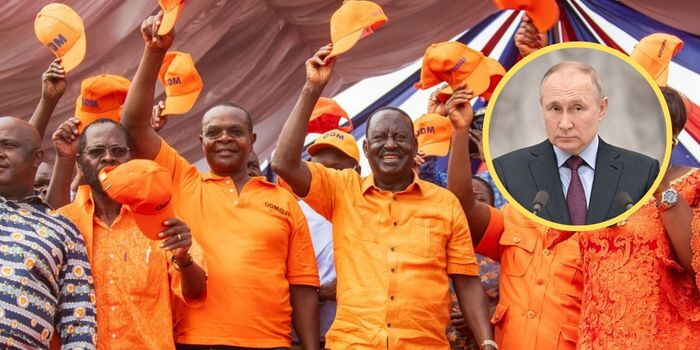A group of leaders from the Orange Democratic Movement (ODM), led by Deputy Party Leader Godfrey Osotsi, recently visited Moscow, Russia, where they met with officials from the United Russia Party (URP), a political party closely connected to President Vladimir Putin.
The meeting took place on Tuesday, 15 July, and involved detailed discussions between the two parties on how they could work together to promote stronger political relations and cooperation between their parties.
According to a statement released after the meeting, “Deputy Party Leader Sen. Godfrey Osotsi led a delegation of ODM members of parliament to a consultative meeting with officials of the United Russia Party at their headquarters in Moscow.”
The statement added, “During the meeting, the two parties held bilateral talks focused on how to cooperate and strengthen political party diplomacy between them.”
Joining Osotsi on this important visit were Siaya Senator Oburu Odinga, who is also a Trustee of ODM, Rarieda Member of Parliament Otiende Amollo, the ODM National Vice Chairman, and Paul Matuyia, a Member of the County Assembly (MCA) from Kitengela Ward.
The ODM delegation was warmly welcomed by Andrey Klimov, a member of the Supreme Council of the United Russia Party and the Deputy Chairperson of the Federal Council Committee on Foreign Relations.
Apart from discussing cooperation, the ODM leaders also delivered a goodwill message from their party leader, former Prime Minister Raila Odinga, to the leaders of United Russia.
Though Vladimir Putin is not officially the leader or a member of the United Russia Party, he is widely regarded as its real leader and the key figure behind the party’s influence.
The United Russia Party was created in 2001 by merging several pro-Kremlin political groups, including one called “Unity,” which was specially formed in 1999 to support then-new Prime Minister Vladimir Putin.
The party quickly rose to power in Russia’s State Duma (the lower house of parliament), largely thanks to Putin’s massive popularity and his handling of major issues like the Chechen conflict.
United Russia effectively became the “party of power,” acting as a tool to ensure that the Kremlin maintained strong control over the legislative branch and to unite political support around Putin.
Between 2008 and 2012, when Putin served as Prime Minister under President Dmitry Medvedev, he formally took on the role of chairman of United Russia. This move helped him keep direct control over the political system even when he was not the president.
After returning to the presidency in 2012, Putin stepped down as party chairman, handing over the position to Dmitry Medvedev, who still leads the party today.
Even though Putin is not an official member of the party, he often speaks at its congresses, influences its agenda, and is publicly recognized as its undisputed leader.
This close connection between Putin and United Russia shows how the party continues to be central to his political power in Russia.
Join Gen Z & Millennials New WhatsApp Channel To Stay Updated On time
https://whatsapp.com/channel/0029VaWT5gSGufImU8R0DO30


